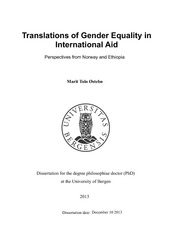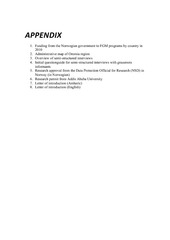| dc.contributor.author | Østebø, Marit Tolo | en_US |
| dc.date.accessioned | 2014-03-07T15:41:47Z | |
| dc.date.available | 2014-03-07T15:41:47Z | |
| dc.date.issued | 2013-12-10 | eng |
| dc.identifier.isbn | 978-82-308-2439-9 | en_US |
| dc.identifier.uri | https://hdl.handle.net/1956/7845 | |
| dc.description.abstract | Background: Gender equality has emerged as a key issue in the global development and human rights discourse during the last three decades. Worldwide support of gender equality by a wide range of actors such as transnational organizations, civil society organizations, national governments and donor countries suggest that gender equality has been established as a global norm. This study aims to explore what happens when gender equality and gender related policies, travel between diverse localities and actors within the field of international development. The study sheds light on how differently situated actors conceptualize and translate ‘gender equality’, how they relate to, are influenced by and use gender policies, and how they strategically maneuver and navigate their way through the complex landscape that constitutes development as social practice. Methods: This is a qualitative, study in which findings from a multi-sited research project conducted from 2010-12 constitutes the core of the empirical material. The study also draws on a conventional long-term ethnographic fieldwork conducted during 2005-6 among the Arsi Oromo of Ethiopia. With a particular focus on the relationship between Norwegian gender and aid policies and gender and development related initiatives in Ethiopia, the study combines an analysis of practices, policies and conceptions. Participant observation, semi-structured interviews and textual policy analysis were methods used in the study. Results: The study revealed diverse meanings of gender equality in Norwegian gender policies and among differently situated actors involved in gender and development initiatives in Ethiopia. Gender equality is being translated in different and even contradictory ways, not only by experts situated in the interface between the global and the local, but by actors at all levels, including grassroots. These translations are influenced by historical, cultural, political, economic and religious factors in a given locality at a particular time. Despite the contested nature of gender equality, the study also shows that gender equality and gender policies represent a strong set of ‘truths’. In this study two examples of strong truths or policies are scrutinized: 1) the increased political pressure on the Norwegian government’s cooperative partners to focus on gender equality, and 2) the global movement against FGM/C and its related interventions in the particular Ethiopian context. Conclusion: The study illustrates that in spite of the existence of a global gender equality norm, gender equality is a highly contested concept that is open to multiple meanings. The open character of gender equality is the reason that the concept has been so widely diffused. Despite the volatile nature of gender equality, and the fact that the concept is being translated differently depending on the actors involved and the context in which they are embedded, this study also illustrates that gender equality norms and policies represent a set of ‘transnational truths’ that are pushed through what may be termed ‘strong policies’. While the pressure inherent in these policies could be interpreted as an example of the Western power over the ‘developing’ world, the study provides examples of how differently situated actors relate to and strategically negotiate their way around these policies, suggesting that an actor-oriented perspective better encompass the complexities and the negotiations that are played out between the different actors in development. | en_US |
| dc.language.iso | eng | eng |
| dc.publisher | The University of Bergen | eng |
| dc.relation.haspart | Paper I: Selbervik, H. & Østebø, M.T. (2013). “Gender Equality in International Aid: What has Norwegian Gender Politics Got to Do With It?” Gender, Technology and Development 17 (2): 205-228. The article is not available in BORA due to publisher restrictions. The published version is available at: <a href="http://dx.doi.org/10.1177/0971852413488716" target="blank">http://dx.doi.org/10.1177/0971852413488716 </a> | en_US |
| dc.relation.haspart | Paper II: Østebø, M. T., Haukanes, H. & Blystad, A. (2013). “Strong State Policies on Gender and Aid: Threats and Opportunities for Norwegian Faith-based Organizations” Forum for Development Studies 40(2): 193-216. The article is not available in BORA due to publisher restrictions. The published version is available at: <a href="http://dx.doi.org/10.1080/08039410.2012.752761" target="blank">http://dx.doi.org/10.1080/08039410.2012.752761</a> | en_US |
| dc.relation.haspart | Paper III: Østebø, M.T. & Østebø, T. “Religious Leaders - a Magic Bullet when addressing Gender Sensitive Issues? The case of Muslim Leaders and ‘Female Genital Mutilation’ in Ethiopia.”. The article is not available in BORA. | en_US |
| dc.relation.haspart | Paper IV: Østebø, M.T. “Rethinking Vernacularization: Translations of Gender Equality among rural Arsi Oromo in Ethiopia”. The article is not available in BORA. | en_US |
| dc.title | Translations of Gender Equality in International Aid. Perspectives from Norway and Ethiopia | en_US |
| dc.type | Doctoral thesis | |
| dc.rights.holder | Copyright the author. All rights reserved | |

